Tax Law Assignment: Taxation of Patent Infringement and Land Sale
VerifiedAdded on 2023/01/03
|16
|4674
|81
Homework Assignment
AI Summary
This assignment analyzes two key tax law questions. The first question focuses on Our Earth Pty Ltd, a company that received compensation for patent infringement and lost revenue. The assignment examines whether the compensation for patent infringement is taxable, considering its capital nature, and whether the lost revenue and interest received are assessable income. It also considers the tax treatment of reimbursed legal fees. The second question addresses the sale of land, determining if the land is a pre-CGT asset and whether the sale of subdivided land constitutes carrying on a business, impacting how profits are assessed under section 25(1) of the ITAA 1936. The assignment applies relevant case law and legislation to determine the tax implications of these scenarios, providing a detailed analysis of assessable income, capital gains tax, and relevant tax provisions.
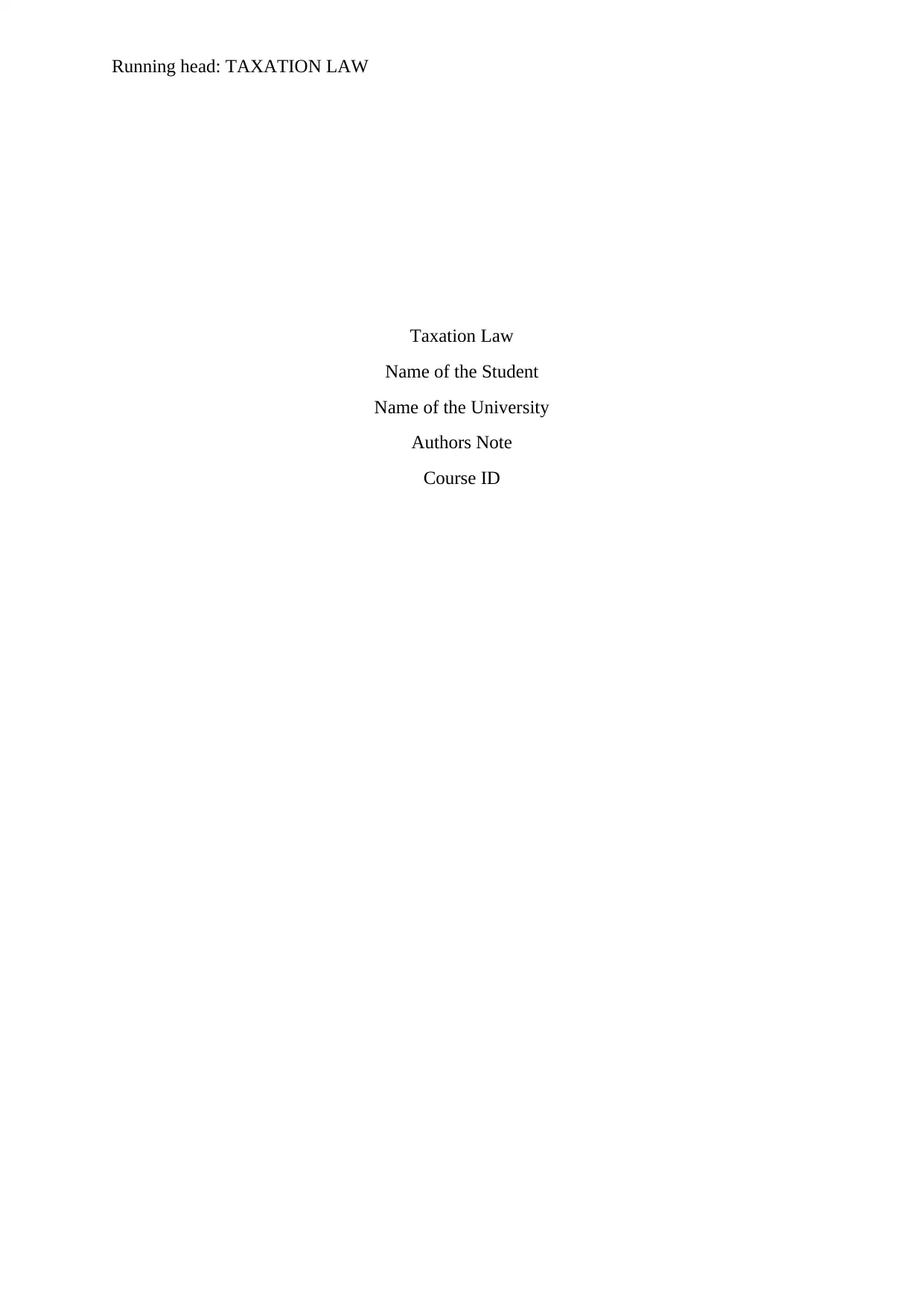
Running head: TAXATION LAW
Taxation Law
Name of the Student
Name of the University
Authors Note
Course ID
Taxation Law
Name of the Student
Name of the University
Authors Note
Course ID
Paraphrase This Document
Need a fresh take? Get an instant paraphrase of this document with our AI Paraphraser
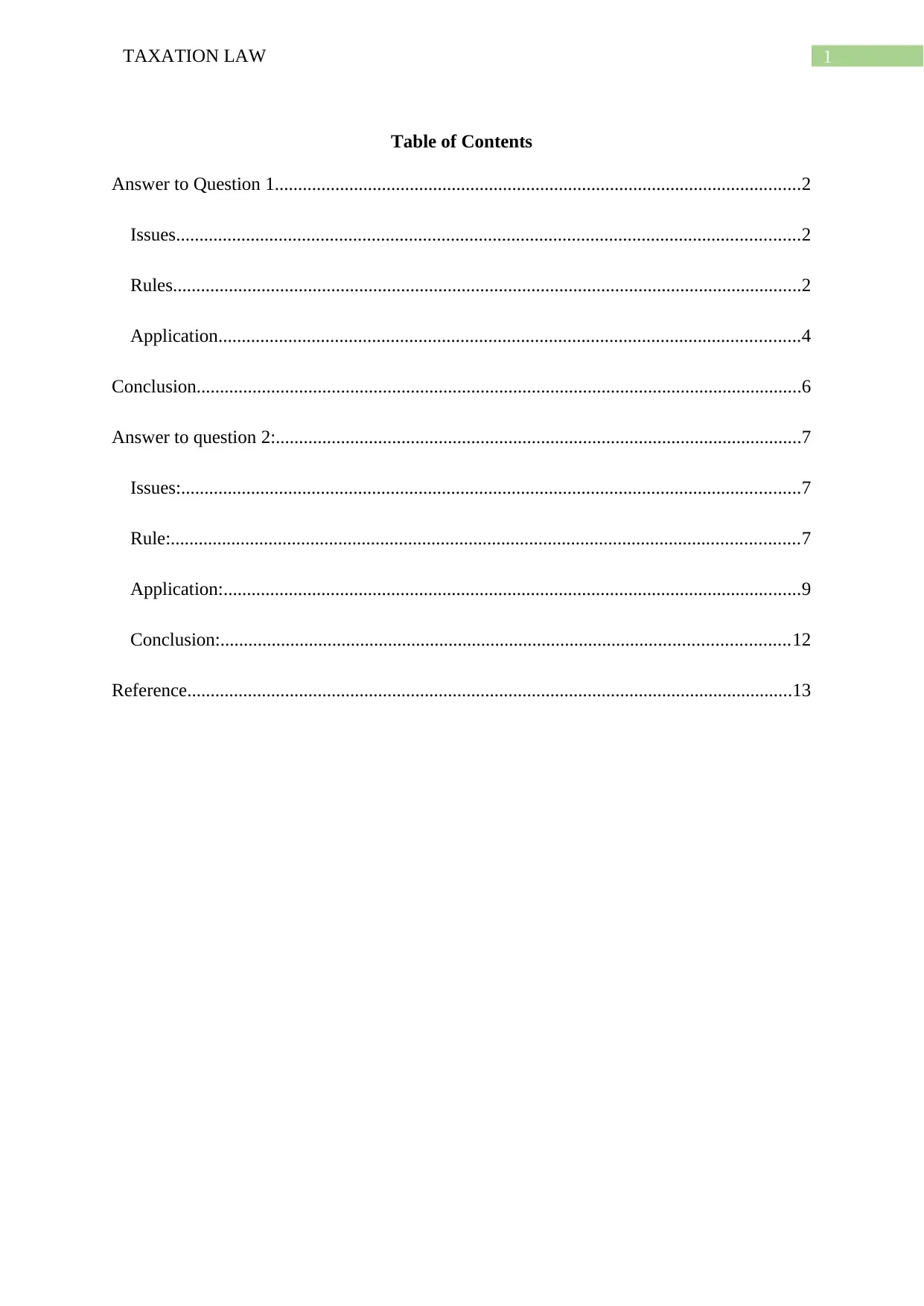
1TAXATION LAW
Table of Contents
Answer to Question 1.................................................................................................................2
Issues......................................................................................................................................2
Rules.......................................................................................................................................2
Application.............................................................................................................................4
Conclusion..................................................................................................................................6
Answer to question 2:.................................................................................................................7
Issues:.....................................................................................................................................7
Rule:.......................................................................................................................................7
Application:............................................................................................................................9
Conclusion:..........................................................................................................................12
Reference..................................................................................................................................13
Table of Contents
Answer to Question 1.................................................................................................................2
Issues......................................................................................................................................2
Rules.......................................................................................................................................2
Application.............................................................................................................................4
Conclusion..................................................................................................................................6
Answer to question 2:.................................................................................................................7
Issues:.....................................................................................................................................7
Rule:.......................................................................................................................................7
Application:............................................................................................................................9
Conclusion:..........................................................................................................................12
Reference..................................................................................................................................13
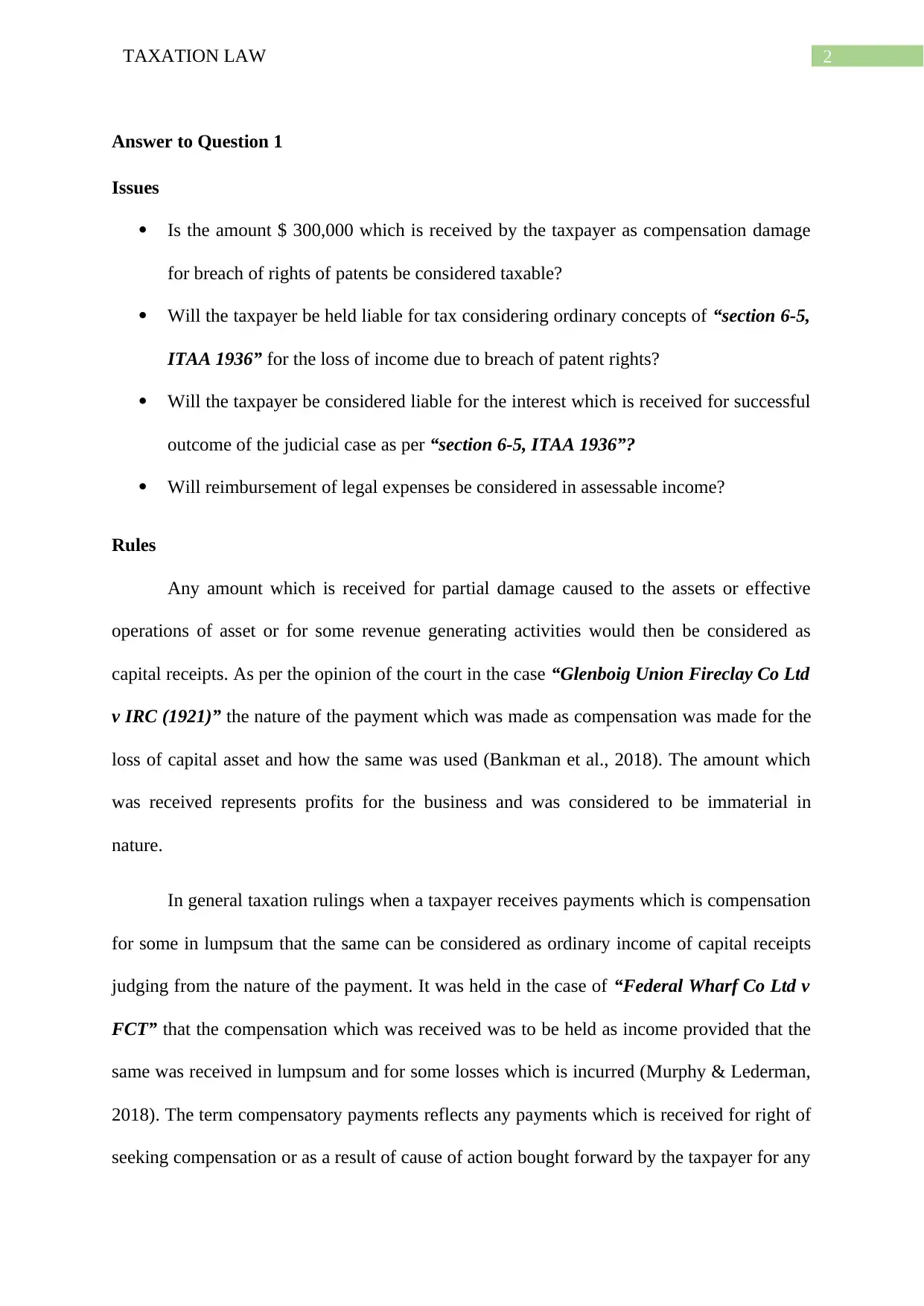
2TAXATION LAW
Answer to Question 1
Issues
Is the amount $ 300,000 which is received by the taxpayer as compensation damage
for breach of rights of patents be considered taxable?
Will the taxpayer be held liable for tax considering ordinary concepts of “section 6-5,
ITAA 1936” for the loss of income due to breach of patent rights?
Will the taxpayer be considered liable for the interest which is received for successful
outcome of the judicial case as per “section 6-5, ITAA 1936”?
Will reimbursement of legal expenses be considered in assessable income?
Rules
Any amount which is received for partial damage caused to the assets or effective
operations of asset or for some revenue generating activities would then be considered as
capital receipts. As per the opinion of the court in the case “Glenboig Union Fireclay Co Ltd
v IRC (1921)” the nature of the payment which was made as compensation was made for the
loss of capital asset and how the same was used (Bankman et al., 2018). The amount which
was received represents profits for the business and was considered to be immaterial in
nature.
In general taxation rulings when a taxpayer receives payments which is compensation
for some in lumpsum that the same can be considered as ordinary income of capital receipts
judging from the nature of the payment. It was held in the case of “Federal Wharf Co Ltd v
FCT” that the compensation which was received was to be held as income provided that the
same was received in lumpsum and for some losses which is incurred (Murphy & Lederman,
2018). The term compensatory payments reflects any payments which is received for right of
seeking compensation or as a result of cause of action bought forward by the taxpayer for any
Answer to Question 1
Issues
Is the amount $ 300,000 which is received by the taxpayer as compensation damage
for breach of rights of patents be considered taxable?
Will the taxpayer be held liable for tax considering ordinary concepts of “section 6-5,
ITAA 1936” for the loss of income due to breach of patent rights?
Will the taxpayer be considered liable for the interest which is received for successful
outcome of the judicial case as per “section 6-5, ITAA 1936”?
Will reimbursement of legal expenses be considered in assessable income?
Rules
Any amount which is received for partial damage caused to the assets or effective
operations of asset or for some revenue generating activities would then be considered as
capital receipts. As per the opinion of the court in the case “Glenboig Union Fireclay Co Ltd
v IRC (1921)” the nature of the payment which was made as compensation was made for the
loss of capital asset and how the same was used (Bankman et al., 2018). The amount which
was received represents profits for the business and was considered to be immaterial in
nature.
In general taxation rulings when a taxpayer receives payments which is compensation
for some in lumpsum that the same can be considered as ordinary income of capital receipts
judging from the nature of the payment. It was held in the case of “Federal Wharf Co Ltd v
FCT” that the compensation which was received was to be held as income provided that the
same was received in lumpsum and for some losses which is incurred (Murphy & Lederman,
2018). The term compensatory payments reflects any payments which is received for right of
seeking compensation or as a result of cause of action bought forward by the taxpayer for any
⊘ This is a preview!⊘
Do you want full access?
Subscribe today to unlock all pages.

Trusted by 1+ million students worldwide
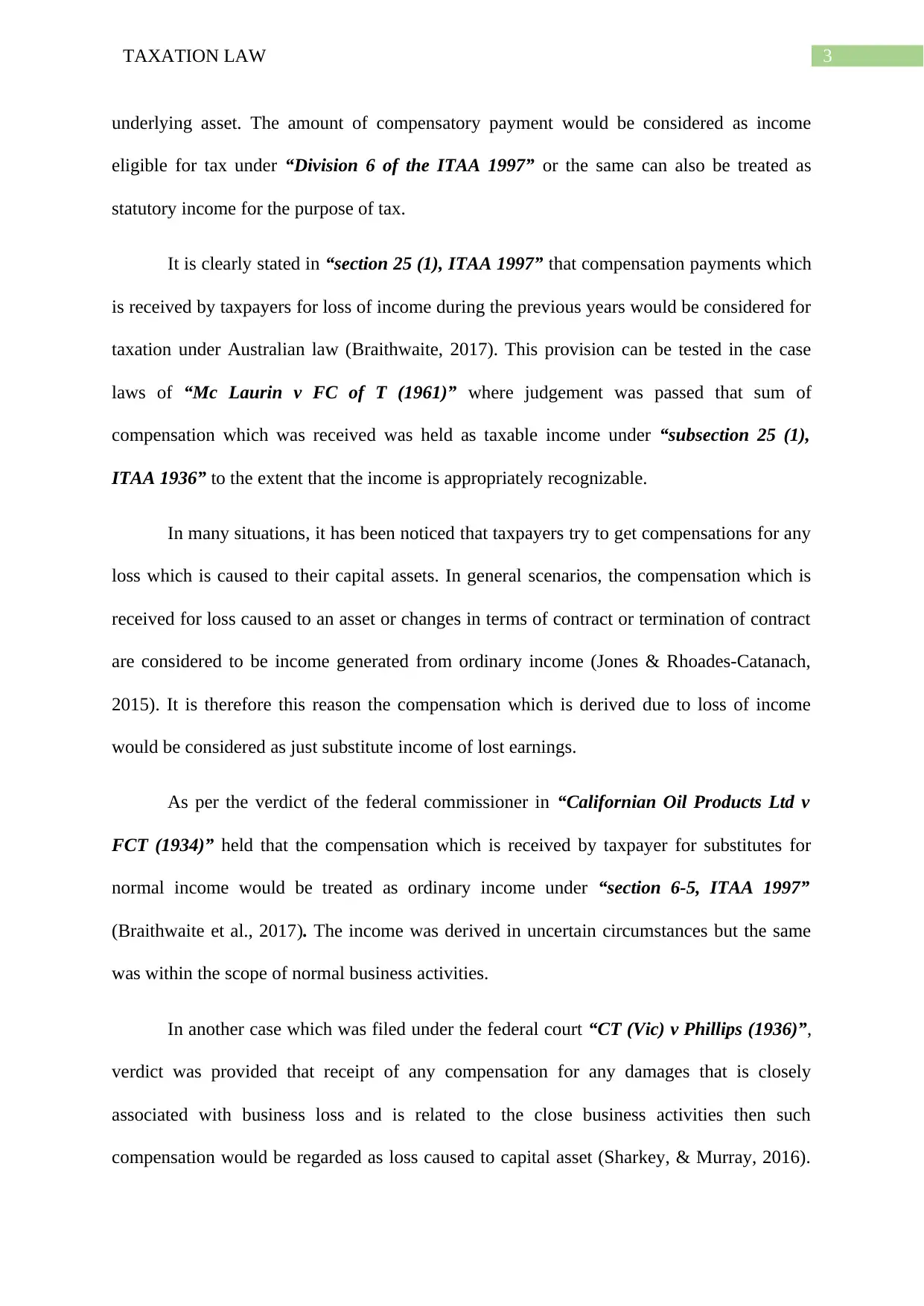
3TAXATION LAW
underlying asset. The amount of compensatory payment would be considered as income
eligible for tax under “Division 6 of the ITAA 1997” or the same can also be treated as
statutory income for the purpose of tax.
It is clearly stated in “section 25 (1), ITAA 1997” that compensation payments which
is received by taxpayers for loss of income during the previous years would be considered for
taxation under Australian law (Braithwaite, 2017). This provision can be tested in the case
laws of “Mc Laurin v FC of T (1961)” where judgement was passed that sum of
compensation which was received was held as taxable income under “subsection 25 (1),
ITAA 1936” to the extent that the income is appropriately recognizable.
In many situations, it has been noticed that taxpayers try to get compensations for any
loss which is caused to their capital assets. In general scenarios, the compensation which is
received for loss caused to an asset or changes in terms of contract or termination of contract
are considered to be income generated from ordinary income (Jones & Rhoades-Catanach,
2015). It is therefore this reason the compensation which is derived due to loss of income
would be considered as just substitute income of lost earnings.
As per the verdict of the federal commissioner in “Californian Oil Products Ltd v
FCT (1934)” held that the compensation which is received by taxpayer for substitutes for
normal income would be treated as ordinary income under “section 6-5, ITAA 1997”
(Braithwaite et al., 2017). The income was derived in uncertain circumstances but the same
was within the scope of normal business activities.
In another case which was filed under the federal court “CT (Vic) v Phillips (1936)”,
verdict was provided that receipt of any compensation for any damages that is closely
associated with business loss and is related to the close business activities then such
compensation would be regarded as loss caused to capital asset (Sharkey, & Murray, 2016).
underlying asset. The amount of compensatory payment would be considered as income
eligible for tax under “Division 6 of the ITAA 1997” or the same can also be treated as
statutory income for the purpose of tax.
It is clearly stated in “section 25 (1), ITAA 1997” that compensation payments which
is received by taxpayers for loss of income during the previous years would be considered for
taxation under Australian law (Braithwaite, 2017). This provision can be tested in the case
laws of “Mc Laurin v FC of T (1961)” where judgement was passed that sum of
compensation which was received was held as taxable income under “subsection 25 (1),
ITAA 1936” to the extent that the income is appropriately recognizable.
In many situations, it has been noticed that taxpayers try to get compensations for any
loss which is caused to their capital assets. In general scenarios, the compensation which is
received for loss caused to an asset or changes in terms of contract or termination of contract
are considered to be income generated from ordinary income (Jones & Rhoades-Catanach,
2015). It is therefore this reason the compensation which is derived due to loss of income
would be considered as just substitute income of lost earnings.
As per the verdict of the federal commissioner in “Californian Oil Products Ltd v
FCT (1934)” held that the compensation which is received by taxpayer for substitutes for
normal income would be treated as ordinary income under “section 6-5, ITAA 1997”
(Braithwaite et al., 2017). The income was derived in uncertain circumstances but the same
was within the scope of normal business activities.
In another case which was filed under the federal court “CT (Vic) v Phillips (1936)”,
verdict was provided that receipt of any compensation for any damages that is closely
associated with business loss and is related to the close business activities then such
compensation would be regarded as loss caused to capital asset (Sharkey, & Murray, 2016).
Paraphrase This Document
Need a fresh take? Get an instant paraphrase of this document with our AI Paraphraser
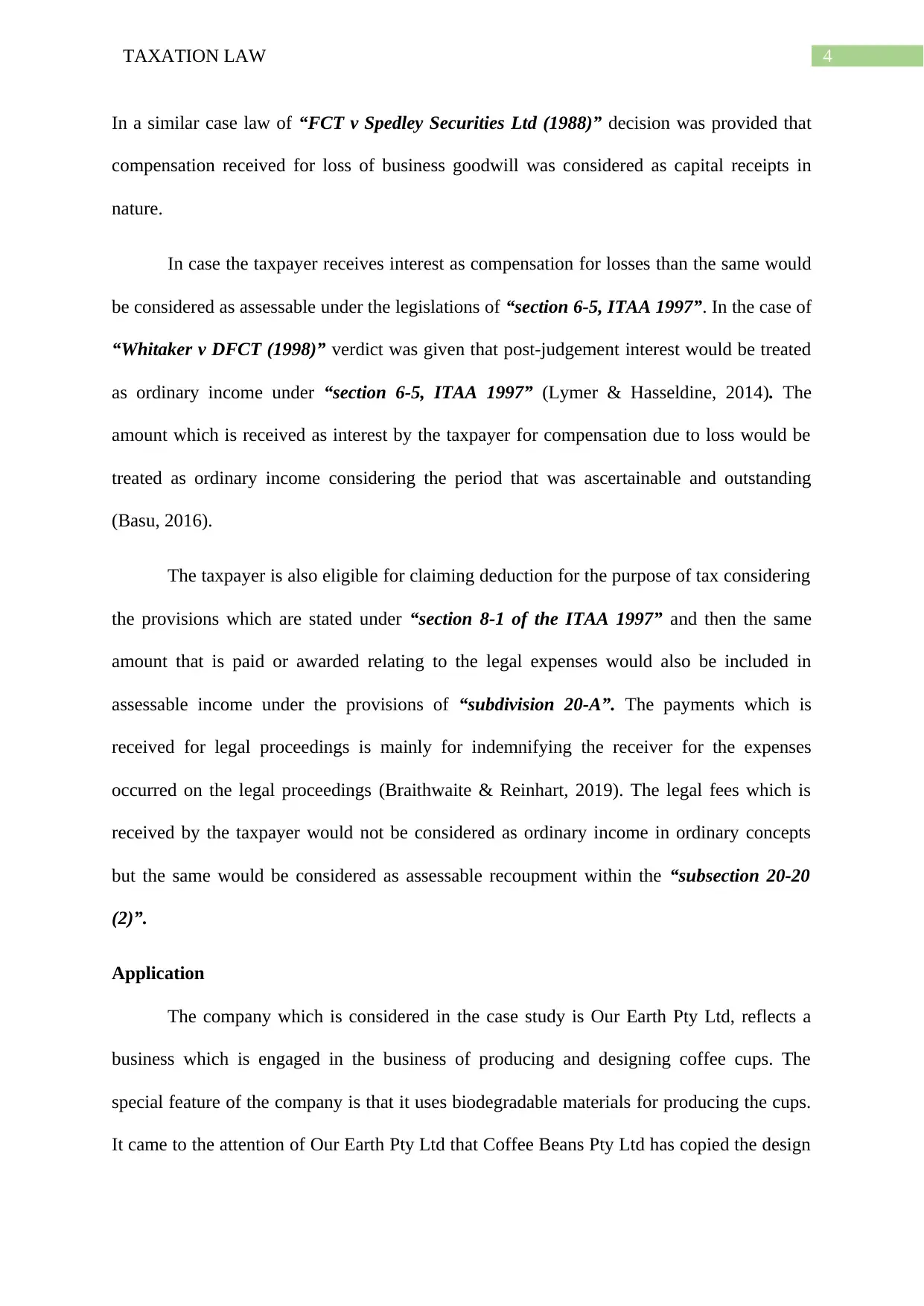
4TAXATION LAW
In a similar case law of “FCT v Spedley Securities Ltd (1988)” decision was provided that
compensation received for loss of business goodwill was considered as capital receipts in
nature.
In case the taxpayer receives interest as compensation for losses than the same would
be considered as assessable under the legislations of “section 6-5, ITAA 1997”. In the case of
“Whitaker v DFCT (1998)” verdict was given that post-judgement interest would be treated
as ordinary income under “section 6-5, ITAA 1997” (Lymer & Hasseldine, 2014). The
amount which is received as interest by the taxpayer for compensation due to loss would be
treated as ordinary income considering the period that was ascertainable and outstanding
(Basu, 2016).
The taxpayer is also eligible for claiming deduction for the purpose of tax considering
the provisions which are stated under “section 8-1 of the ITAA 1997” and then the same
amount that is paid or awarded relating to the legal expenses would also be included in
assessable income under the provisions of “subdivision 20-A”. The payments which is
received for legal proceedings is mainly for indemnifying the receiver for the expenses
occurred on the legal proceedings (Braithwaite & Reinhart, 2019). The legal fees which is
received by the taxpayer would not be considered as ordinary income in ordinary concepts
but the same would be considered as assessable recoupment within the “subsection 20-20
(2)”.
Application
The company which is considered in the case study is Our Earth Pty Ltd, reflects a
business which is engaged in the business of producing and designing coffee cups. The
special feature of the company is that it uses biodegradable materials for producing the cups.
It came to the attention of Our Earth Pty Ltd that Coffee Beans Pty Ltd has copied the design
In a similar case law of “FCT v Spedley Securities Ltd (1988)” decision was provided that
compensation received for loss of business goodwill was considered as capital receipts in
nature.
In case the taxpayer receives interest as compensation for losses than the same would
be considered as assessable under the legislations of “section 6-5, ITAA 1997”. In the case of
“Whitaker v DFCT (1998)” verdict was given that post-judgement interest would be treated
as ordinary income under “section 6-5, ITAA 1997” (Lymer & Hasseldine, 2014). The
amount which is received as interest by the taxpayer for compensation due to loss would be
treated as ordinary income considering the period that was ascertainable and outstanding
(Basu, 2016).
The taxpayer is also eligible for claiming deduction for the purpose of tax considering
the provisions which are stated under “section 8-1 of the ITAA 1997” and then the same
amount that is paid or awarded relating to the legal expenses would also be included in
assessable income under the provisions of “subdivision 20-A”. The payments which is
received for legal proceedings is mainly for indemnifying the receiver for the expenses
occurred on the legal proceedings (Braithwaite & Reinhart, 2019). The legal fees which is
received by the taxpayer would not be considered as ordinary income in ordinary concepts
but the same would be considered as assessable recoupment within the “subsection 20-20
(2)”.
Application
The company which is considered in the case study is Our Earth Pty Ltd, reflects a
business which is engaged in the business of producing and designing coffee cups. The
special feature of the company is that it uses biodegradable materials for producing the cups.
It came to the attention of Our Earth Pty Ltd that Coffee Beans Pty Ltd has copied the design
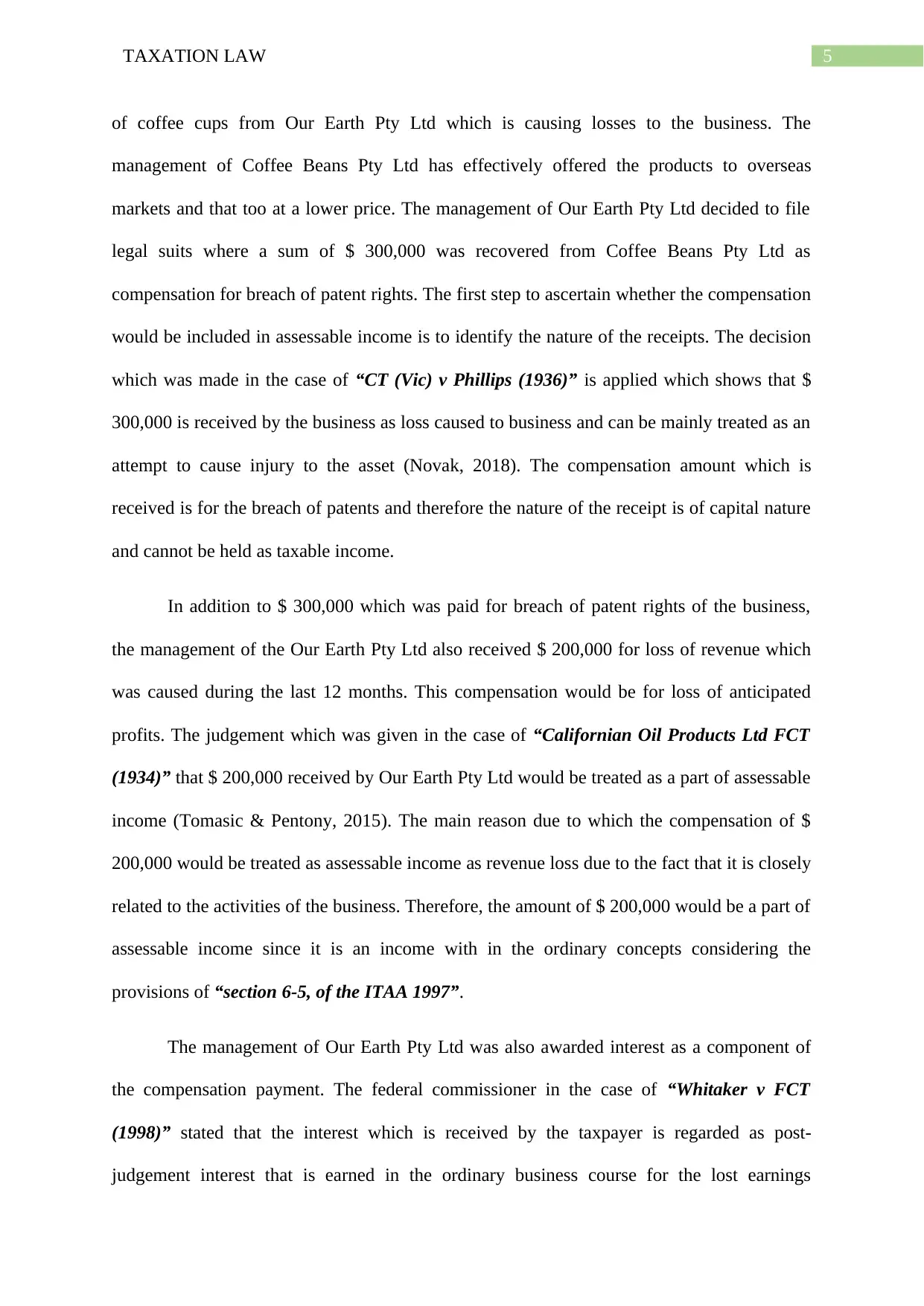
5TAXATION LAW
of coffee cups from Our Earth Pty Ltd which is causing losses to the business. The
management of Coffee Beans Pty Ltd has effectively offered the products to overseas
markets and that too at a lower price. The management of Our Earth Pty Ltd decided to file
legal suits where a sum of $ 300,000 was recovered from Coffee Beans Pty Ltd as
compensation for breach of patent rights. The first step to ascertain whether the compensation
would be included in assessable income is to identify the nature of the receipts. The decision
which was made in the case of “CT (Vic) v Phillips (1936)” is applied which shows that $
300,000 is received by the business as loss caused to business and can be mainly treated as an
attempt to cause injury to the asset (Novak, 2018). The compensation amount which is
received is for the breach of patents and therefore the nature of the receipt is of capital nature
and cannot be held as taxable income.
In addition to $ 300,000 which was paid for breach of patent rights of the business,
the management of the Our Earth Pty Ltd also received $ 200,000 for loss of revenue which
was caused during the last 12 months. This compensation would be for loss of anticipated
profits. The judgement which was given in the case of “Californian Oil Products Ltd FCT
(1934)” that $ 200,000 received by Our Earth Pty Ltd would be treated as a part of assessable
income (Tomasic & Pentony, 2015). The main reason due to which the compensation of $
200,000 would be treated as assessable income as revenue loss due to the fact that it is closely
related to the activities of the business. Therefore, the amount of $ 200,000 would be a part of
assessable income since it is an income with in the ordinary concepts considering the
provisions of “section 6-5, of the ITAA 1997”.
The management of Our Earth Pty Ltd was also awarded interest as a component of
the compensation payment. The federal commissioner in the case of “Whitaker v FCT
(1998)” stated that the interest which is received by the taxpayer is regarded as post-
judgement interest that is earned in the ordinary business course for the lost earnings
of coffee cups from Our Earth Pty Ltd which is causing losses to the business. The
management of Coffee Beans Pty Ltd has effectively offered the products to overseas
markets and that too at a lower price. The management of Our Earth Pty Ltd decided to file
legal suits where a sum of $ 300,000 was recovered from Coffee Beans Pty Ltd as
compensation for breach of patent rights. The first step to ascertain whether the compensation
would be included in assessable income is to identify the nature of the receipts. The decision
which was made in the case of “CT (Vic) v Phillips (1936)” is applied which shows that $
300,000 is received by the business as loss caused to business and can be mainly treated as an
attempt to cause injury to the asset (Novak, 2018). The compensation amount which is
received is for the breach of patents and therefore the nature of the receipt is of capital nature
and cannot be held as taxable income.
In addition to $ 300,000 which was paid for breach of patent rights of the business,
the management of the Our Earth Pty Ltd also received $ 200,000 for loss of revenue which
was caused during the last 12 months. This compensation would be for loss of anticipated
profits. The judgement which was given in the case of “Californian Oil Products Ltd FCT
(1934)” that $ 200,000 received by Our Earth Pty Ltd would be treated as a part of assessable
income (Tomasic & Pentony, 2015). The main reason due to which the compensation of $
200,000 would be treated as assessable income as revenue loss due to the fact that it is closely
related to the activities of the business. Therefore, the amount of $ 200,000 would be a part of
assessable income since it is an income with in the ordinary concepts considering the
provisions of “section 6-5, of the ITAA 1997”.
The management of Our Earth Pty Ltd was also awarded interest as a component of
the compensation payment. The federal commissioner in the case of “Whitaker v FCT
(1998)” stated that the interest which is received by the taxpayer is regarded as post-
judgement interest that is earned in the ordinary business course for the lost earnings
⊘ This is a preview!⊘
Do you want full access?
Subscribe today to unlock all pages.

Trusted by 1+ million students worldwide
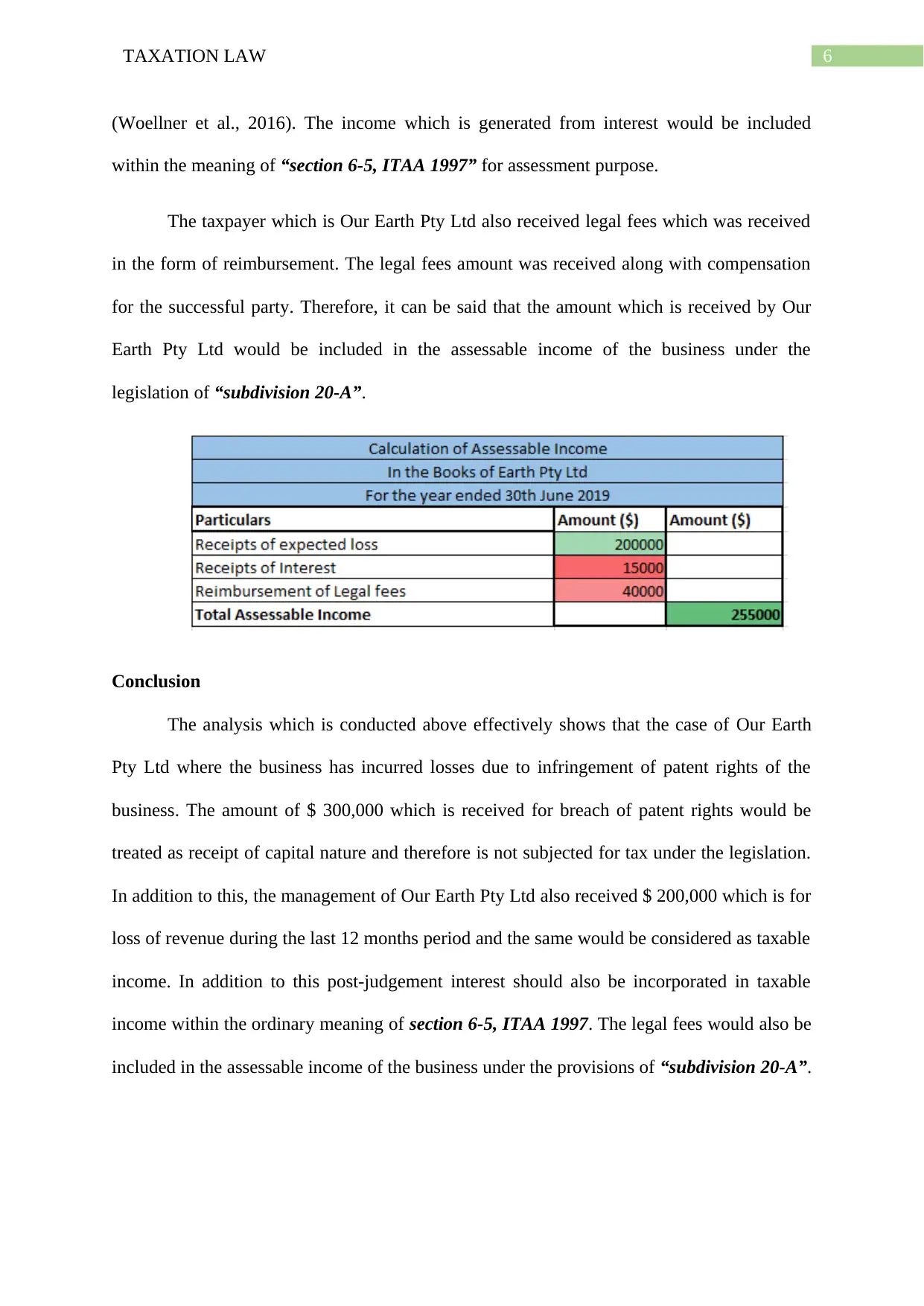
6TAXATION LAW
(Woellner et al., 2016). The income which is generated from interest would be included
within the meaning of “section 6-5, ITAA 1997” for assessment purpose.
The taxpayer which is Our Earth Pty Ltd also received legal fees which was received
in the form of reimbursement. The legal fees amount was received along with compensation
for the successful party. Therefore, it can be said that the amount which is received by Our
Earth Pty Ltd would be included in the assessable income of the business under the
legislation of “subdivision 20-A”.
Conclusion
The analysis which is conducted above effectively shows that the case of Our Earth
Pty Ltd where the business has incurred losses due to infringement of patent rights of the
business. The amount of $ 300,000 which is received for breach of patent rights would be
treated as receipt of capital nature and therefore is not subjected for tax under the legislation.
In addition to this, the management of Our Earth Pty Ltd also received $ 200,000 which is for
loss of revenue during the last 12 months period and the same would be considered as taxable
income. In addition to this post-judgement interest should also be incorporated in taxable
income within the ordinary meaning of section 6-5, ITAA 1997. The legal fees would also be
included in the assessable income of the business under the provisions of “subdivision 20-A”.
(Woellner et al., 2016). The income which is generated from interest would be included
within the meaning of “section 6-5, ITAA 1997” for assessment purpose.
The taxpayer which is Our Earth Pty Ltd also received legal fees which was received
in the form of reimbursement. The legal fees amount was received along with compensation
for the successful party. Therefore, it can be said that the amount which is received by Our
Earth Pty Ltd would be included in the assessable income of the business under the
legislation of “subdivision 20-A”.
Conclusion
The analysis which is conducted above effectively shows that the case of Our Earth
Pty Ltd where the business has incurred losses due to infringement of patent rights of the
business. The amount of $ 300,000 which is received for breach of patent rights would be
treated as receipt of capital nature and therefore is not subjected for tax under the legislation.
In addition to this, the management of Our Earth Pty Ltd also received $ 200,000 which is for
loss of revenue during the last 12 months period and the same would be considered as taxable
income. In addition to this post-judgement interest should also be incorporated in taxable
income within the ordinary meaning of section 6-5, ITAA 1997. The legal fees would also be
included in the assessable income of the business under the provisions of “subdivision 20-A”.
Paraphrase This Document
Need a fresh take? Get an instant paraphrase of this document with our AI Paraphraser
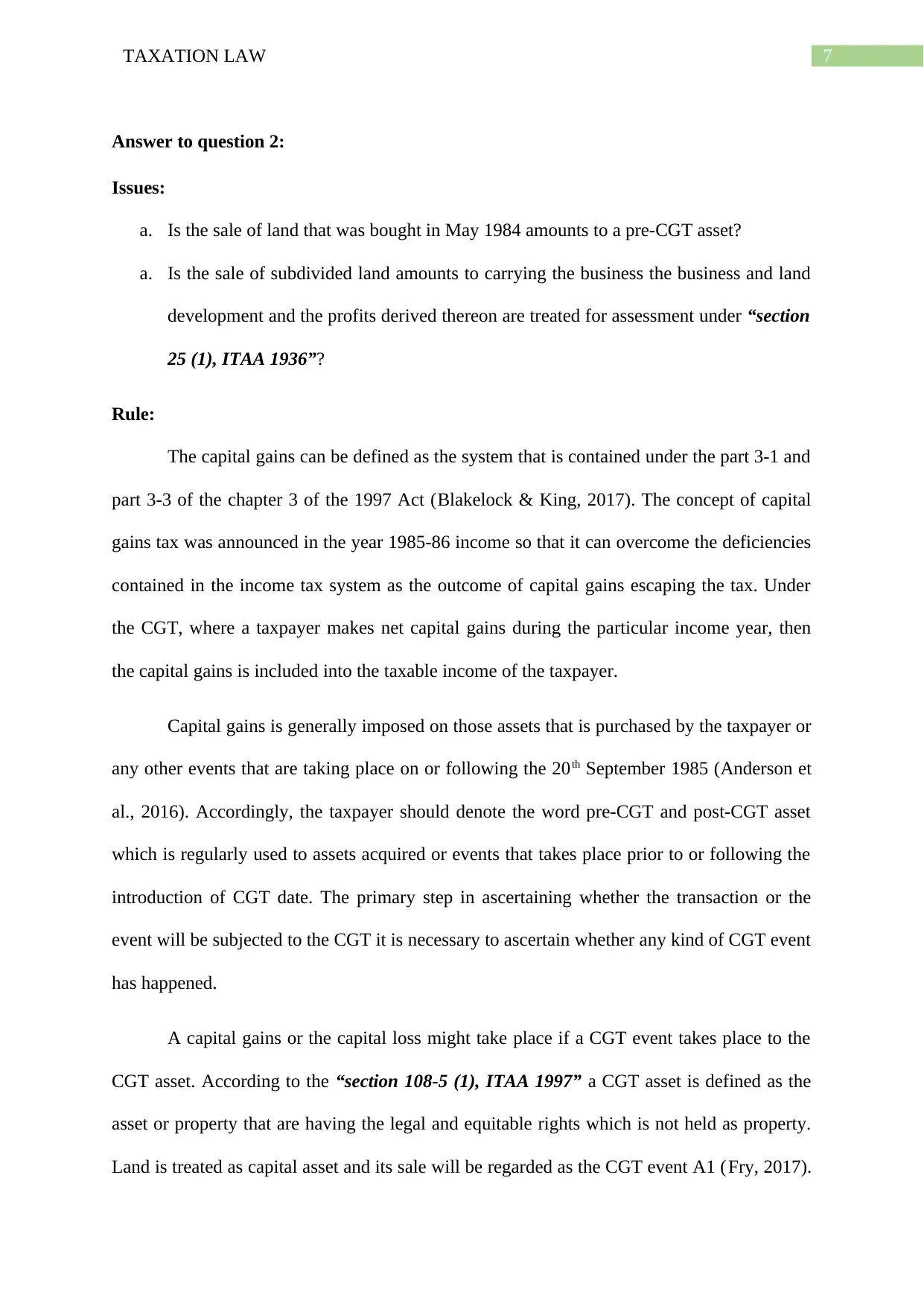
7TAXATION LAW
Answer to question 2:
Issues:
a. Is the sale of land that was bought in May 1984 amounts to a pre-CGT asset?
a. Is the sale of subdivided land amounts to carrying the business the business and land
development and the profits derived thereon are treated for assessment under “section
25 (1), ITAA 1936”?
Rule:
The capital gains can be defined as the system that is contained under the part 3-1 and
part 3-3 of the chapter 3 of the 1997 Act (Blakelock & King, 2017). The concept of capital
gains tax was announced in the year 1985-86 income so that it can overcome the deficiencies
contained in the income tax system as the outcome of capital gains escaping the tax. Under
the CGT, where a taxpayer makes net capital gains during the particular income year, then
the capital gains is included into the taxable income of the taxpayer.
Capital gains is generally imposed on those assets that is purchased by the taxpayer or
any other events that are taking place on or following the 20th September 1985 (Anderson et
al., 2016). Accordingly, the taxpayer should denote the word pre-CGT and post-CGT asset
which is regularly used to assets acquired or events that takes place prior to or following the
introduction of CGT date. The primary step in ascertaining whether the transaction or the
event will be subjected to the CGT it is necessary to ascertain whether any kind of CGT event
has happened.
A capital gains or the capital loss might take place if a CGT event takes place to the
CGT asset. According to the “section 108-5 (1), ITAA 1997” a CGT asset is defined as the
asset or property that are having the legal and equitable rights which is not held as property.
Land is treated as capital asset and its sale will be regarded as the CGT event A1 (Fry, 2017).
Answer to question 2:
Issues:
a. Is the sale of land that was bought in May 1984 amounts to a pre-CGT asset?
a. Is the sale of subdivided land amounts to carrying the business the business and land
development and the profits derived thereon are treated for assessment under “section
25 (1), ITAA 1936”?
Rule:
The capital gains can be defined as the system that is contained under the part 3-1 and
part 3-3 of the chapter 3 of the 1997 Act (Blakelock & King, 2017). The concept of capital
gains tax was announced in the year 1985-86 income so that it can overcome the deficiencies
contained in the income tax system as the outcome of capital gains escaping the tax. Under
the CGT, where a taxpayer makes net capital gains during the particular income year, then
the capital gains is included into the taxable income of the taxpayer.
Capital gains is generally imposed on those assets that is purchased by the taxpayer or
any other events that are taking place on or following the 20th September 1985 (Anderson et
al., 2016). Accordingly, the taxpayer should denote the word pre-CGT and post-CGT asset
which is regularly used to assets acquired or events that takes place prior to or following the
introduction of CGT date. The primary step in ascertaining whether the transaction or the
event will be subjected to the CGT it is necessary to ascertain whether any kind of CGT event
has happened.
A capital gains or the capital loss might take place if a CGT event takes place to the
CGT asset. According to the “section 108-5 (1), ITAA 1997” a CGT asset is defined as the
asset or property that are having the legal and equitable rights which is not held as property.
Land is treated as capital asset and its sale will be regarded as the CGT event A1 (Fry, 2017).
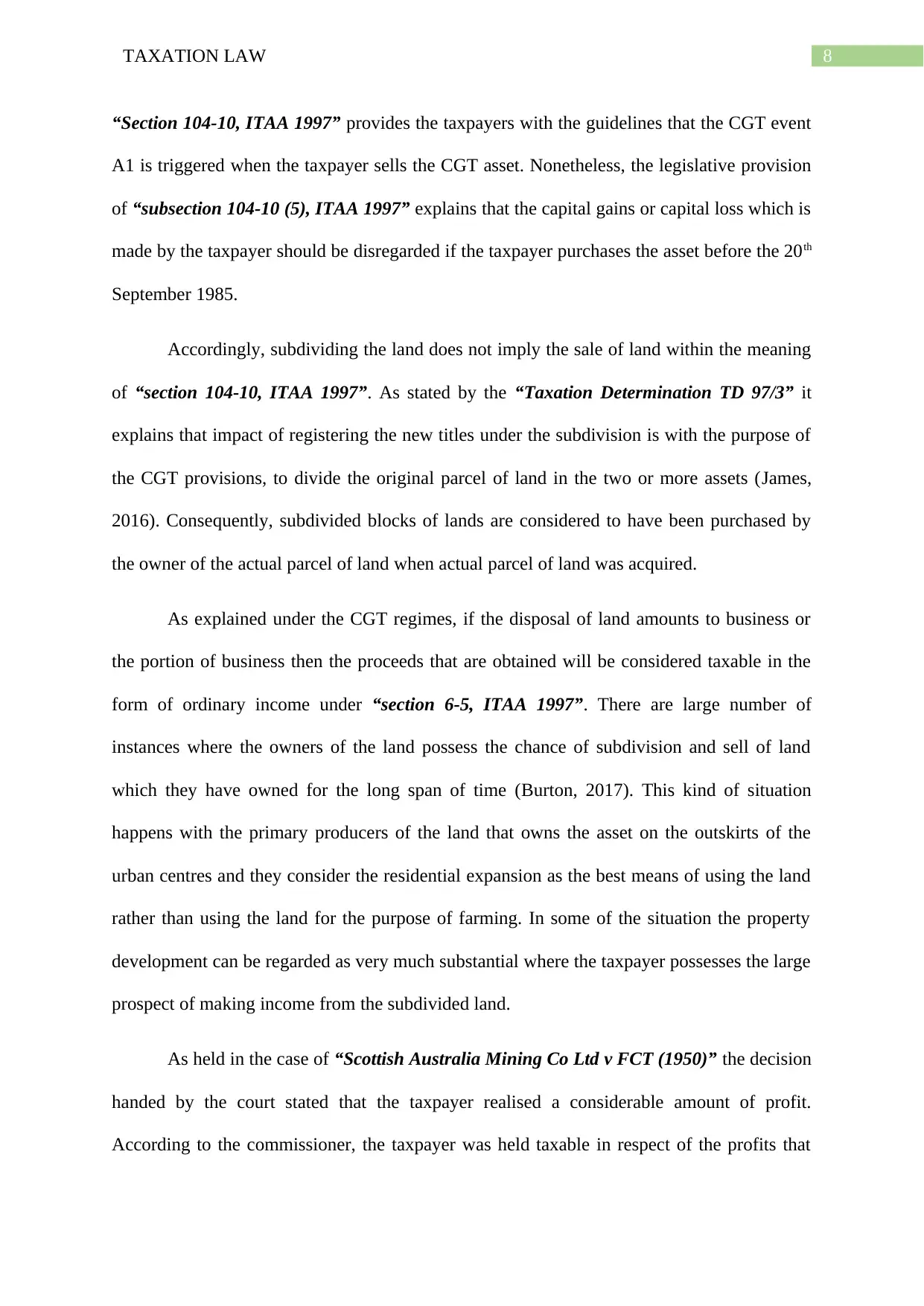
8TAXATION LAW
“Section 104-10, ITAA 1997” provides the taxpayers with the guidelines that the CGT event
A1 is triggered when the taxpayer sells the CGT asset. Nonetheless, the legislative provision
of “subsection 104-10 (5), ITAA 1997” explains that the capital gains or capital loss which is
made by the taxpayer should be disregarded if the taxpayer purchases the asset before the 20th
September 1985.
Accordingly, subdividing the land does not imply the sale of land within the meaning
of “section 104-10, ITAA 1997”. As stated by the “Taxation Determination TD 97/3” it
explains that impact of registering the new titles under the subdivision is with the purpose of
the CGT provisions, to divide the original parcel of land in the two or more assets (James,
2016). Consequently, subdivided blocks of lands are considered to have been purchased by
the owner of the actual parcel of land when actual parcel of land was acquired.
As explained under the CGT regimes, if the disposal of land amounts to business or
the portion of business then the proceeds that are obtained will be considered taxable in the
form of ordinary income under “section 6-5, ITAA 1997”. There are large number of
instances where the owners of the land possess the chance of subdivision and sell of land
which they have owned for the long span of time (Burton, 2017). This kind of situation
happens with the primary producers of the land that owns the asset on the outskirts of the
urban centres and they consider the residential expansion as the best means of using the land
rather than using the land for the purpose of farming. In some of the situation the property
development can be regarded as very much substantial where the taxpayer possesses the large
prospect of making income from the subdivided land.
As held in the case of “Scottish Australia Mining Co Ltd v FCT (1950)” the decision
handed by the court stated that the taxpayer realised a considerable amount of profit.
According to the commissioner, the taxpayer was held taxable in respect of the profits that
“Section 104-10, ITAA 1997” provides the taxpayers with the guidelines that the CGT event
A1 is triggered when the taxpayer sells the CGT asset. Nonetheless, the legislative provision
of “subsection 104-10 (5), ITAA 1997” explains that the capital gains or capital loss which is
made by the taxpayer should be disregarded if the taxpayer purchases the asset before the 20th
September 1985.
Accordingly, subdividing the land does not imply the sale of land within the meaning
of “section 104-10, ITAA 1997”. As stated by the “Taxation Determination TD 97/3” it
explains that impact of registering the new titles under the subdivision is with the purpose of
the CGT provisions, to divide the original parcel of land in the two or more assets (James,
2016). Consequently, subdivided blocks of lands are considered to have been purchased by
the owner of the actual parcel of land when actual parcel of land was acquired.
As explained under the CGT regimes, if the disposal of land amounts to business or
the portion of business then the proceeds that are obtained will be considered taxable in the
form of ordinary income under “section 6-5, ITAA 1997”. There are large number of
instances where the owners of the land possess the chance of subdivision and sell of land
which they have owned for the long span of time (Burton, 2017). This kind of situation
happens with the primary producers of the land that owns the asset on the outskirts of the
urban centres and they consider the residential expansion as the best means of using the land
rather than using the land for the purpose of farming. In some of the situation the property
development can be regarded as very much substantial where the taxpayer possesses the large
prospect of making income from the subdivided land.
As held in the case of “Scottish Australia Mining Co Ltd v FCT (1950)” the decision
handed by the court stated that the taxpayer realised a considerable amount of profit.
According to the commissioner, the taxpayer was held taxable in respect of the profits that
⊘ This is a preview!⊘
Do you want full access?
Subscribe today to unlock all pages.

Trusted by 1+ million students worldwide
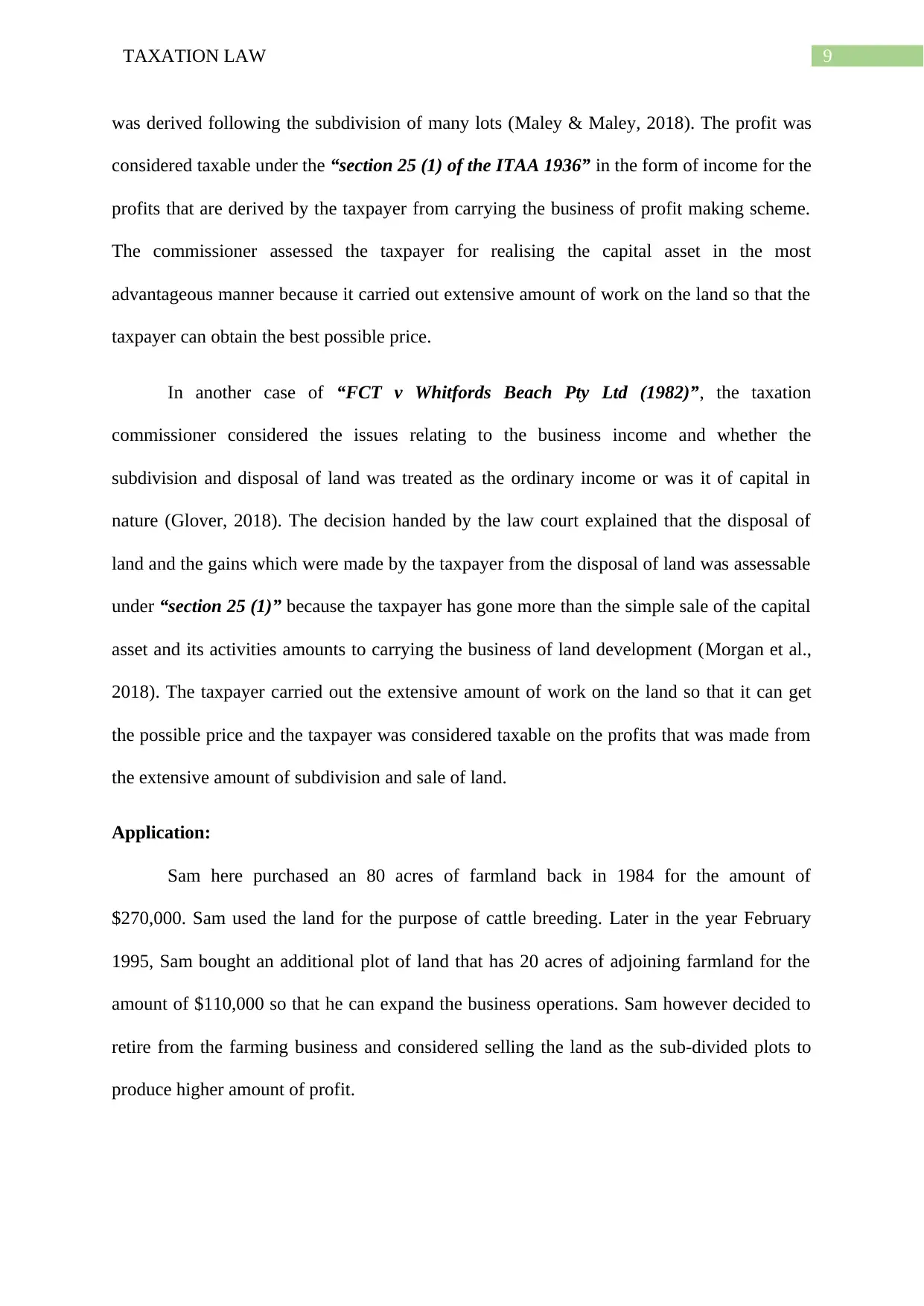
9TAXATION LAW
was derived following the subdivision of many lots (Maley & Maley, 2018). The profit was
considered taxable under the “section 25 (1) of the ITAA 1936” in the form of income for the
profits that are derived by the taxpayer from carrying the business of profit making scheme.
The commissioner assessed the taxpayer for realising the capital asset in the most
advantageous manner because it carried out extensive amount of work on the land so that the
taxpayer can obtain the best possible price.
In another case of “FCT v Whitfords Beach Pty Ltd (1982)”, the taxation
commissioner considered the issues relating to the business income and whether the
subdivision and disposal of land was treated as the ordinary income or was it of capital in
nature (Glover, 2018). The decision handed by the law court explained that the disposal of
land and the gains which were made by the taxpayer from the disposal of land was assessable
under “section 25 (1)” because the taxpayer has gone more than the simple sale of the capital
asset and its activities amounts to carrying the business of land development (Morgan et al.,
2018). The taxpayer carried out the extensive amount of work on the land so that it can get
the possible price and the taxpayer was considered taxable on the profits that was made from
the extensive amount of subdivision and sale of land.
Application:
Sam here purchased an 80 acres of farmland back in 1984 for the amount of
$270,000. Sam used the land for the purpose of cattle breeding. Later in the year February
1995, Sam bought an additional plot of land that has 20 acres of adjoining farmland for the
amount of $110,000 so that he can expand the business operations. Sam however decided to
retire from the farming business and considered selling the land as the sub-divided plots to
produce higher amount of profit.
was derived following the subdivision of many lots (Maley & Maley, 2018). The profit was
considered taxable under the “section 25 (1) of the ITAA 1936” in the form of income for the
profits that are derived by the taxpayer from carrying the business of profit making scheme.
The commissioner assessed the taxpayer for realising the capital asset in the most
advantageous manner because it carried out extensive amount of work on the land so that the
taxpayer can obtain the best possible price.
In another case of “FCT v Whitfords Beach Pty Ltd (1982)”, the taxation
commissioner considered the issues relating to the business income and whether the
subdivision and disposal of land was treated as the ordinary income or was it of capital in
nature (Glover, 2018). The decision handed by the law court explained that the disposal of
land and the gains which were made by the taxpayer from the disposal of land was assessable
under “section 25 (1)” because the taxpayer has gone more than the simple sale of the capital
asset and its activities amounts to carrying the business of land development (Morgan et al.,
2018). The taxpayer carried out the extensive amount of work on the land so that it can get
the possible price and the taxpayer was considered taxable on the profits that was made from
the extensive amount of subdivision and sale of land.
Application:
Sam here purchased an 80 acres of farmland back in 1984 for the amount of
$270,000. Sam used the land for the purpose of cattle breeding. Later in the year February
1995, Sam bought an additional plot of land that has 20 acres of adjoining farmland for the
amount of $110,000 so that he can expand the business operations. Sam however decided to
retire from the farming business and considered selling the land as the sub-divided plots to
produce higher amount of profit.
Paraphrase This Document
Need a fresh take? Get an instant paraphrase of this document with our AI Paraphraser
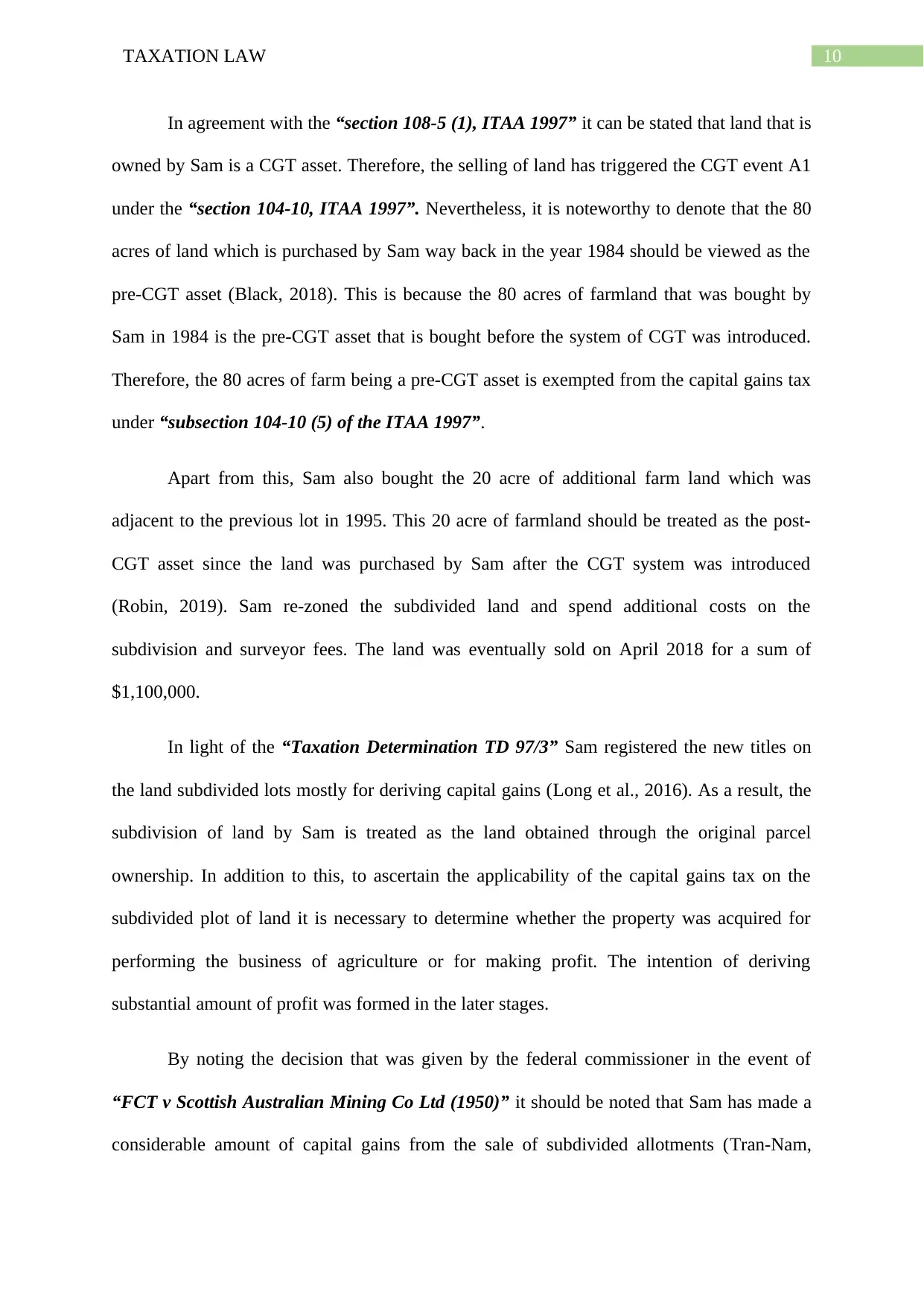
10TAXATION LAW
In agreement with the “section 108-5 (1), ITAA 1997” it can be stated that land that is
owned by Sam is a CGT asset. Therefore, the selling of land has triggered the CGT event A1
under the “section 104-10, ITAA 1997”. Nevertheless, it is noteworthy to denote that the 80
acres of land which is purchased by Sam way back in the year 1984 should be viewed as the
pre-CGT asset (Black, 2018). This is because the 80 acres of farmland that was bought by
Sam in 1984 is the pre-CGT asset that is bought before the system of CGT was introduced.
Therefore, the 80 acres of farm being a pre-CGT asset is exempted from the capital gains tax
under “subsection 104-10 (5) of the ITAA 1997”.
Apart from this, Sam also bought the 20 acre of additional farm land which was
adjacent to the previous lot in 1995. This 20 acre of farmland should be treated as the post-
CGT asset since the land was purchased by Sam after the CGT system was introduced
(Robin, 2019). Sam re-zoned the subdivided land and spend additional costs on the
subdivision and surveyor fees. The land was eventually sold on April 2018 for a sum of
$1,100,000.
In light of the “Taxation Determination TD 97/3” Sam registered the new titles on
the land subdivided lots mostly for deriving capital gains (Long et al., 2016). As a result, the
subdivision of land by Sam is treated as the land obtained through the original parcel
ownership. In addition to this, to ascertain the applicability of the capital gains tax on the
subdivided plot of land it is necessary to determine whether the property was acquired for
performing the business of agriculture or for making profit. The intention of deriving
substantial amount of profit was formed in the later stages.
By noting the decision that was given by the federal commissioner in the event of
“FCT v Scottish Australian Mining Co Ltd (1950)” it should be noted that Sam has made a
considerable amount of capital gains from the sale of subdivided allotments (Tran-Nam,
In agreement with the “section 108-5 (1), ITAA 1997” it can be stated that land that is
owned by Sam is a CGT asset. Therefore, the selling of land has triggered the CGT event A1
under the “section 104-10, ITAA 1997”. Nevertheless, it is noteworthy to denote that the 80
acres of land which is purchased by Sam way back in the year 1984 should be viewed as the
pre-CGT asset (Black, 2018). This is because the 80 acres of farmland that was bought by
Sam in 1984 is the pre-CGT asset that is bought before the system of CGT was introduced.
Therefore, the 80 acres of farm being a pre-CGT asset is exempted from the capital gains tax
under “subsection 104-10 (5) of the ITAA 1997”.
Apart from this, Sam also bought the 20 acre of additional farm land which was
adjacent to the previous lot in 1995. This 20 acre of farmland should be treated as the post-
CGT asset since the land was purchased by Sam after the CGT system was introduced
(Robin, 2019). Sam re-zoned the subdivided land and spend additional costs on the
subdivision and surveyor fees. The land was eventually sold on April 2018 for a sum of
$1,100,000.
In light of the “Taxation Determination TD 97/3” Sam registered the new titles on
the land subdivided lots mostly for deriving capital gains (Long et al., 2016). As a result, the
subdivision of land by Sam is treated as the land obtained through the original parcel
ownership. In addition to this, to ascertain the applicability of the capital gains tax on the
subdivided plot of land it is necessary to determine whether the property was acquired for
performing the business of agriculture or for making profit. The intention of deriving
substantial amount of profit was formed in the later stages.
By noting the decision that was given by the federal commissioner in the event of
“FCT v Scottish Australian Mining Co Ltd (1950)” it should be noted that Sam has made a
considerable amount of capital gains from the sale of subdivided allotments (Tran-Nam,
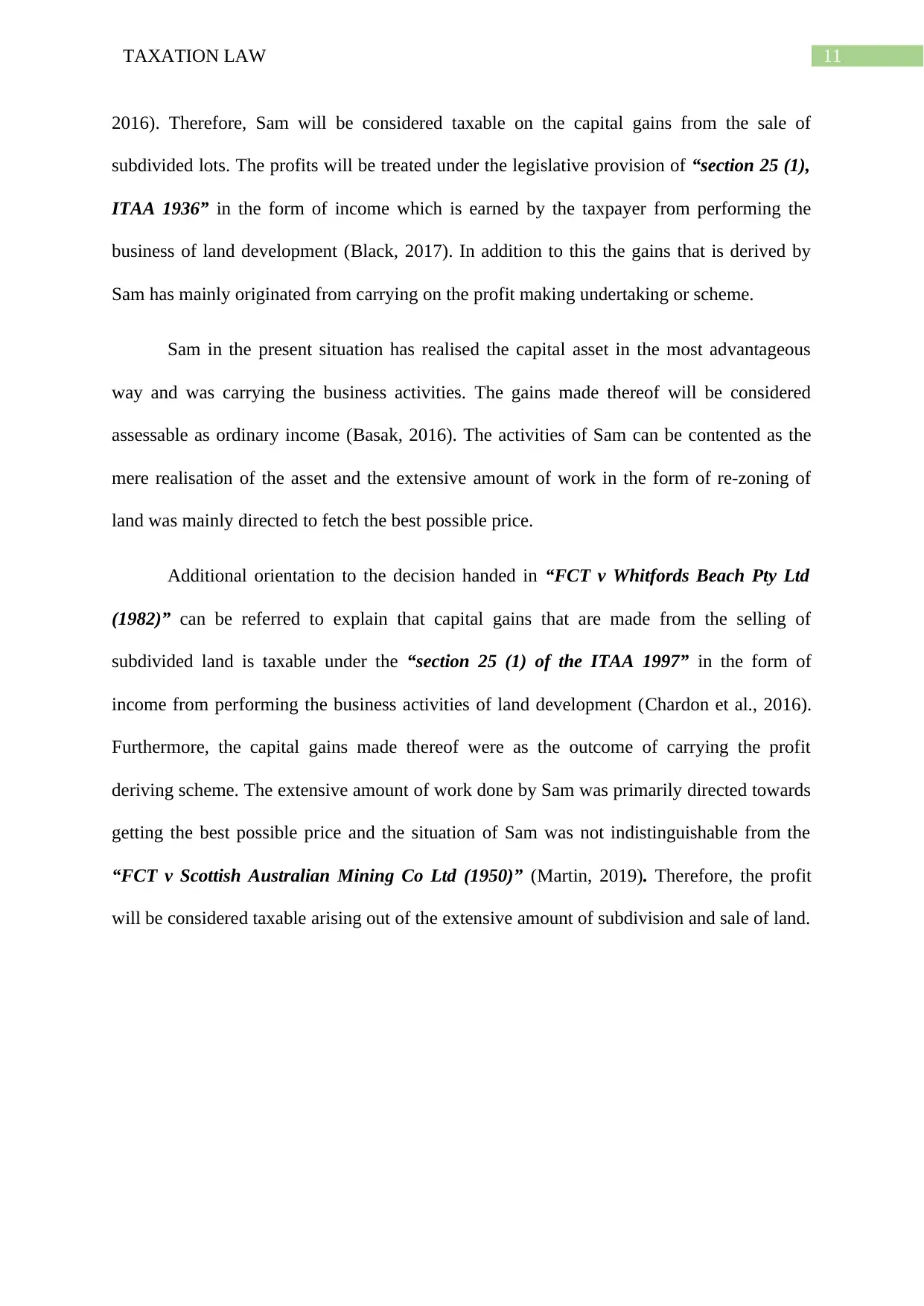
11TAXATION LAW
2016). Therefore, Sam will be considered taxable on the capital gains from the sale of
subdivided lots. The profits will be treated under the legislative provision of “section 25 (1),
ITAA 1936” in the form of income which is earned by the taxpayer from performing the
business of land development (Black, 2017). In addition to this the gains that is derived by
Sam has mainly originated from carrying on the profit making undertaking or scheme.
Sam in the present situation has realised the capital asset in the most advantageous
way and was carrying the business activities. The gains made thereof will be considered
assessable as ordinary income (Basak, 2016). The activities of Sam can be contented as the
mere realisation of the asset and the extensive amount of work in the form of re-zoning of
land was mainly directed to fetch the best possible price.
Additional orientation to the decision handed in “FCT v Whitfords Beach Pty Ltd
(1982)” can be referred to explain that capital gains that are made from the selling of
subdivided land is taxable under the “section 25 (1) of the ITAA 1997” in the form of
income from performing the business activities of land development (Chardon et al., 2016).
Furthermore, the capital gains made thereof were as the outcome of carrying the profit
deriving scheme. The extensive amount of work done by Sam was primarily directed towards
getting the best possible price and the situation of Sam was not indistinguishable from the
“FCT v Scottish Australian Mining Co Ltd (1950)” (Martin, 2019). Therefore, the profit
will be considered taxable arising out of the extensive amount of subdivision and sale of land.
2016). Therefore, Sam will be considered taxable on the capital gains from the sale of
subdivided lots. The profits will be treated under the legislative provision of “section 25 (1),
ITAA 1936” in the form of income which is earned by the taxpayer from performing the
business of land development (Black, 2017). In addition to this the gains that is derived by
Sam has mainly originated from carrying on the profit making undertaking or scheme.
Sam in the present situation has realised the capital asset in the most advantageous
way and was carrying the business activities. The gains made thereof will be considered
assessable as ordinary income (Basak, 2016). The activities of Sam can be contented as the
mere realisation of the asset and the extensive amount of work in the form of re-zoning of
land was mainly directed to fetch the best possible price.
Additional orientation to the decision handed in “FCT v Whitfords Beach Pty Ltd
(1982)” can be referred to explain that capital gains that are made from the selling of
subdivided land is taxable under the “section 25 (1) of the ITAA 1997” in the form of
income from performing the business activities of land development (Chardon et al., 2016).
Furthermore, the capital gains made thereof were as the outcome of carrying the profit
deriving scheme. The extensive amount of work done by Sam was primarily directed towards
getting the best possible price and the situation of Sam was not indistinguishable from the
“FCT v Scottish Australian Mining Co Ltd (1950)” (Martin, 2019). Therefore, the profit
will be considered taxable arising out of the extensive amount of subdivision and sale of land.
⊘ This is a preview!⊘
Do you want full access?
Subscribe today to unlock all pages.

Trusted by 1+ million students worldwide
1 out of 16
Related Documents
Your All-in-One AI-Powered Toolkit for Academic Success.
+13062052269
info@desklib.com
Available 24*7 on WhatsApp / Email
![[object Object]](/_next/static/media/star-bottom.7253800d.svg)
Unlock your academic potential
Copyright © 2020–2026 A2Z Services. All Rights Reserved. Developed and managed by ZUCOL.




